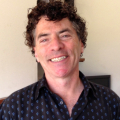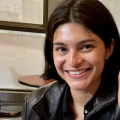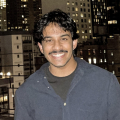Mind Wandering
Our mind-wandering research can be roughly divided into five categories.
Related Questions
News
- Daily Nexus Feature: Finding Focus Studies + Updates
- A Curiosity Practice Bonanza!
- Daydreaming on the Colin McEnroe Show
- The Washington Post Feature: Why do we get our best ideas in the shower?
- The Common Creatives Talk Mind "Wondering" with Dr. Schooler
- The New York Times: Why Daydreaming Is Actually Good For Your Brain
- National Geographic: The science of why you have great ideas in the shower
- Wondering about mindfulness, mind-wandering, and consciousness: Interview with Jonathan Schooler
- The Swaddle: What Causes Our Mind to Zone Out?
- Mind Wandering Can Yield Breakthroughs
- How to hack your unconscious… to find your inner creativity
- Stuck on a Problem? Let Your Mind Wander
- Daydream believer: Is a wandering mind a creative mind?
- Meta-awareness and Mind Wandering: Interview with Dr. Jonathan Schooler
- How much do we think about thinking? Science of Meta-awareness and Mind-wandering
- The Importance of Mind-Wandering
- When the Mind Wanders, Happiness Also Strays
Selected Publications
- Unaware yet reliant on attention: Experience sampling reveals that mind-wandering impedes implicit learning
- The retention of manual flying skills in the automated cockpit
- An Antidote for Wandering Minds
- The Decoupled Mind: Mind-wandering Disrupts Cortical Phase-locking to Perceptual Events
- The Middle Way: Finding the Balance between Mindfulness and Mind-Wandering
- Insights from Quiet Minds: The Converging Fields of Mindfulness and Mind-Wandering
- Thoughts in Flight: Automation Use and Pilots’ Task-Related and Task-Unrelated Thought
- Window to the Wandering Mind: Pupillometry of Spontaneous Thought While Reading
- The default modes of reading: Modulation of posterior cingulate and medial prefrontal cortex connectivity associated with subjective and objective differences in reading experience
- The silver lining of a mind in the clouds: Interesting musings are associated with positive mood while mind-wandering
- Unnoticed intrusions: Dissociations of meta-consciousness in thought suppression
- Thinking one thing, saying another: The behavioral correlates of mind-wandering while reading aloud
- Mindfulness Training Improves Working Memory Capacity and GRE Performance While Reducing Mind Wandering.
- Escaping the here and now: Evidence for a role of the default mode network in perceptually decoupled thought
- Disentangling Decoupling: Comment on Smallwood
- Mindfulness and mind-wandering: Finding convergence through opposing constructs
- Inspired by Distraction Mind Wandering Facilitates Creative Incubation
- Insulation for daydreams: a role for tonic norepinephrine in the facilitation of internally guided thought
- The role of mind-wandering in measurements of general aptitude.
- Cooperation between the default mode network and the frontal–parietal network in the production of an internal train of thought
- Back to the future: Autobiographical planning and the functionality of mind-wandering
- Pupillometric Evidence for the Decoupling of Attention from Perceptual Input during Offline Thought
- Medicine for the wandering mind: Mind wandering in medical practice
- Meta-awareness, perceptual decoupling and the wandering mind
- Threatened to distraction: Mind-wandering as a consequence of stereotype threat
- Catching the mind in flight: Using behavioral indices to detect mindless reading in real time.
- Self-reflection and the temporal focus of the wandering mind.
- Out for a smoke: The impact of cigarette craving on zoning out while reading
- Slow fluctuations in attentional control of sensory cortex
- Eye movements during mindless reading.
- Mind-Wandering
- Experience sampling during fMRI reveals default network and executive system contributions to mind wandering
- Lost in the Sauce The effects of alcohol on mind wandering
- When attention matters: the curious incident of the wandering mind
- Going AWOL in the brain: mind wandering reduces cortical analysis of external events
- Counting the cost of an absent mind: Mind wandering as an underrecognized influence on educational performance
- The lights are on but no one’s home- the decoupling of executive resources when the mind-wanders
- Mind-wandering with and without awareness: An fMRI study of spontaneous thought processes
- The restless mind
- Zoning out while reading: Evidence for dissociations between experience and metaconsciousness.
- Pushing the Limits: Cognitive, Affective, & Neural Plasticity Revealed by an Intensive Multifaceted Intervention
- Early event-related brain potentials and hemispheric asymmetries reveal mind-wandering while reading and predict comprehension
- Language facilitates introspection: verbal mind-wandering has privileged access to consciousness
- Mindfulness in education: Enhancing academic achievement and student well-being by reducing mind-wandering
- Can I get me out of my head? Exploring strategies for controlling the self-referential aspects of the mind-wandering state during reading
- Meditation training influences mind wandering and mindless reading.
- Mind wandering minimizes mind numbing: Reducing semantic-satiation effects through absorptive lapses of attention.
- Mind-wandering and meta-awareness in hypnosis and meditation: Relating executive function across states of consciousness.
- Mind wandering “Ahas” versus mindful reasoning: alternative routes to creative solutions
- Mind Wandering While Driving What Does it Mean and What do we do about it?
- Motivating meta-awareness of mind wandering: A way to catch the mind in flight?
- The Richness of Inner Experience: Relating Styles of Daydreaming to Creative Processes.
- The science of mind wandering: empirically navigating the stream of consciousness
- Stimulating minds to wander
- Vigilance impossible: diligence, distraction, and daydreaming all lead to failures in a practical monitoring task
- Tracking Distraction: The Relationship Between Mind-Wandering, Meta-Awareness, and ADHD Symptomatology
- Young & restless: Validation of the Mind-Wandering Questionnaire (MWQ) reveals disruptive impact of mind-wandering for youth
- States of mind: Characterizing the neural bases of focus and mind-wandering through dynamic functional connectivity
- Slaying the Hydra: Integrative Wellness Training Affects Ten Complementary Measures of Stress
- Teenagers’ Smartphone Use during Homework: An Analysis of Beliefs and Behaviors around Digital Multitasking
- A relationship that makes life worth-living: levels of value orientation explain differences in meaning and life satisfaction.
- Mind-Wandering and Childhood ADHD: Experimental Manipulations across Laboratory and Naturalistic Settings.
- Mind Wondering: Curious Daydreaming and Other Potentially Inspiring Forms of Mind-Wandering
- Jumping about: the role of mind-wandering and attentional flexibility in facilitating creative problem-solving
- What Are People's Lay Theories About Mind Wandering and How Do Those Beliefs Affect Them
- The distracted mind on the wheel: Overall propensity to mind wandering is associated with road crash responsibility.
- Intentionality and meta-awareness of mind wandering: Are they one and the same, or distinct dimensions?
- Unraveling what's on our minds: How different types of mind-wandering affect cognition and behavior
- The Family- Resemblances Framework for Mind- Wandering Remains Well Clad
- Mind Wandering: More Than a Bad Habit
- What's in a Task? Complications in the Study of Task-Unrelated-Thought Variety of Mind Wandering
- The Feasibility of Attention Training for Reducing Mind-wandering and Digital Multitasking in High Schools




















